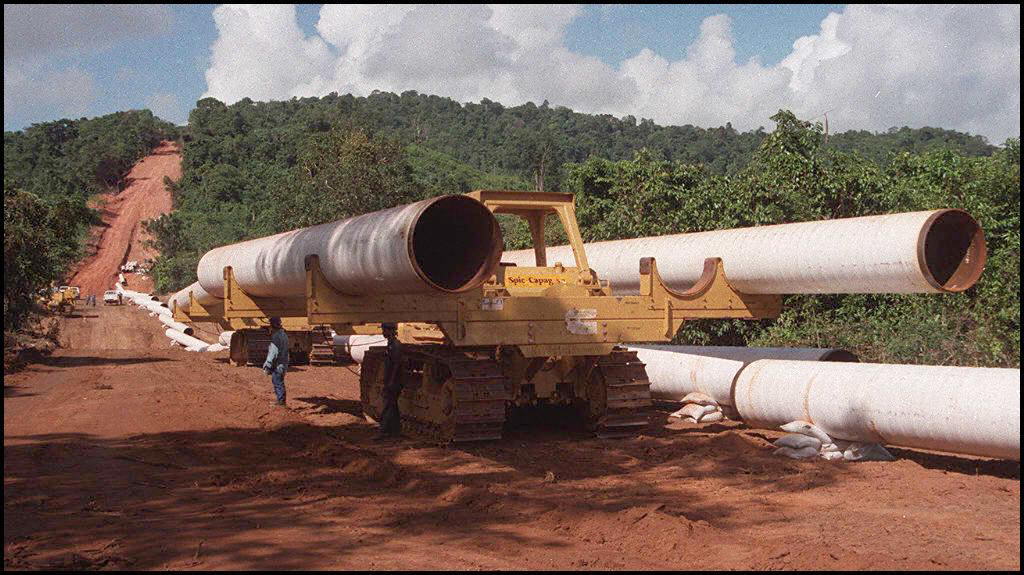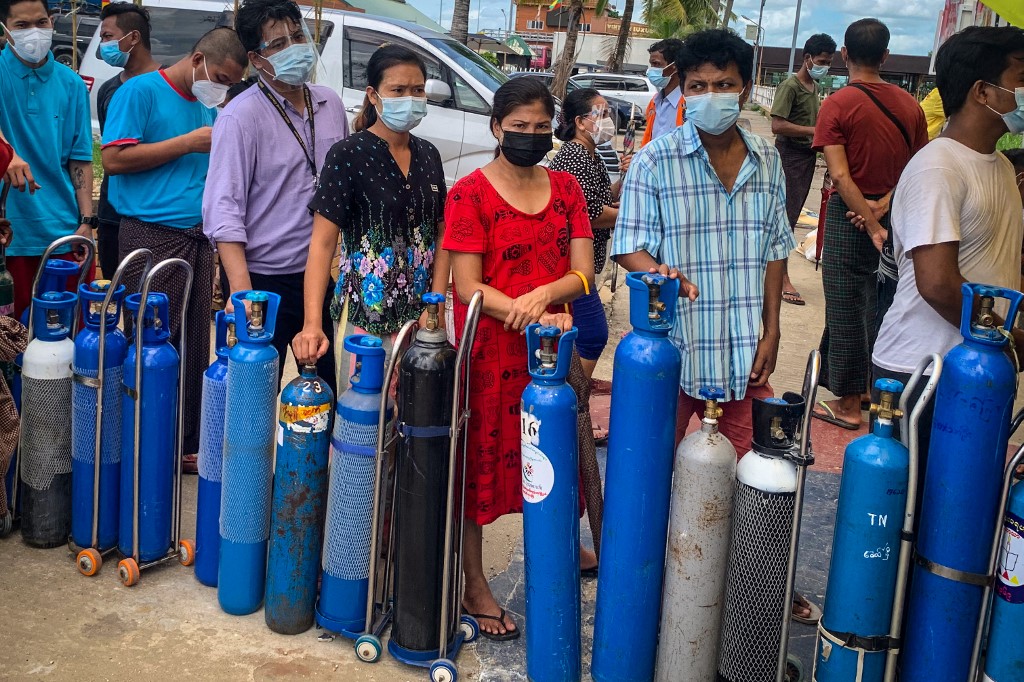Ka Hsaw Wa is the Co-founder & Executive Director of EarthRights International.
Tomorrow, July 17, marks International Day of Justice. An important date in the fight against injustice, it lands on the anniversary of the adoption of the Rome Statute, the founding treaty of the International Criminal Court (ICC) by the United Nations almost two decades ago.
It is a reminder of an international effort to ensure justice and accountability and protect individuals from the most brutal human rights violations, including genocide, crimes against humanity, war crimes, and crimes of aggression.
Back in the early/mid-1990s, three young people (including me) joined together to leverage the power of law and people to defend communities in Myanmar. We wanted to stop the two multinational oil companies, Total and Unocal, who joined the Myanmar army to militarise the “Yadana” pipeline project. The project would use forced labour, land grabs, torture, rape, extrajudicial killings, and attacks on Indigenous and ethnic minority communities.
These companies tried to profit at the expense of local people. As two young US law students and an exiled Burmese human rights activist, we believed in justice and filed a lawsuit against Unocal for egregious human rights violations.
In 2005, Unocal was forced to settle, and this was a groundbreaking moment. Along the way, our organisation EarthRights was founded to work with communities being exploited, often by large corporations, to demand justice and hold to account the perpetrators. Now, over 25 years later, we continue to fight for justice and stand up against powerful actors.
As gas revenues were exempt from the broad sanctions that crippled Myanmar’s economy, the pipeline generated billions of dollars in revenue to the junta regime, providing 70% of its foreign exchange in the 2000s. Back then, the military spent millions on Russian warplanes, but 50 cents a person per year on healthcare.

Today, Total and Chevron (following a merger with Unocal) continue to make and facilitate payments to the junta. Meanwhile, doctors and nurses are being hunted, and health systems have collapsed. People are left with more death and suffering as Covid-19 ravages them without testing, treatment, and lifesaving oxygen.
In its February 2021 coup, the Myanmar military took control of the country and detained the leaders who had won the 2020 election with the votes of an overwhelming majority. Peaceful demonstrators gathered in major cities and towns nationwide to call for the military to leave power, create a genuine federal democracy, and for those detained to be released. Many of our friends in Myanmar have joined the demonstrations.
The demonstrators were not only brave and imaginative, but also peaceful and conscientious. Protesters went out wearing facemasks – concerned about the rising Covid-19 cases. Among the first to stand up against injustice, the doctors and nurses also volunteered at protest sites to provide healthcare assistance.
Social media was alive with videos of an orchestra in Yangon playing Coldplay’s hit song Viva La Vida and the popular Green Day hit 21 Guns. We heard from friends that demonstrators turned up wearing superhero costumes, and some were protesting by sitting in paddling pools filled with water.
The protestors used universal pop culture symbols like Batman and held placards in English, not only because they thought that was cool. But because they wanted the world to understand their plight and aspirations. They believed the international community would step in to help their fight for democracy and freedom. After all, the whole world was now digitally connected. Everyone was watching.
Yet, it only got worse. The military turned violent. A peacefully protesting teenager, Mya Thwate Thwate Khaing, would be the first to pay the price with her life. She was shot with live bullets and taken to hospital on March 9, turned twenty lying lifeless in a coma, and pronounced dead nine days later. The horrifying event was captured on film and circulated online for the world to see. Surely, our friends in Myanmar thought, something would be done now.
From there on, the brutality seems to spiral out. As the death toll climbed over 50, in early March, 19-year-old Angel, real name Kyal Sin, was killed wearing a t-shirt with the words ‘everything will be okay.’ When shot by live ammo, she was trying to get her fellow protestors out of harm’s way.
Following their deaths, hundreds attended the funerals, and international observers released statements expressing concern about what had happened. However, the violence kept escalating. The brutal junta cronies desecrated Angel’s grave, dug the body out, and reburied her in blood-soaked cement.
The shocking display of murder and cruelty would be repeated again and again by the military while the world was watching, with footage captured by brave activists and journalists. When impunity goes unchallenged, and perpetrators of human rights violations fail to be held to account for their crimes, it only ever enables further instances of injustice to occur.
Total and Chevron’s Yadana project continues to provide hundreds of millions of dollars to accounts controlled by the regime, 25 years after it first began bankrolling them
Over the past few months, the global media limelight on Myanmar has faded as the junta brutally oppressed journalists and severely curtailed internet access. But the brutality has not ceased or lessened. Nearly 2,000 people are being hunted by the junta now, as the international community is increasingly focusing on crises elsewhere at the expense of Myanmar’s people.
The Assistance Association for Political Prisoners (AAPP) has documented numerous cases of torture and death in custody. They include not only peaceful activists from all walks of life but their kith and kin, including children. The junta’s death toll is now over 900, and over 6,600 people have been arbitrarily arrested, with over 5,000 still in detention. Reports as of the end of May found that nearly 10% of those killed were under 18.
The government formed by Myanmar’s elected lawmakers in Myanmar – the National Unity Government (NUG) – has reportedly compiled more than 400,000 pieces of evidence of atrocities committed by the military regime. After examining footage of junta’s crackdown against people’s protests, Amnesty International’s Crisis Evidence Lab found definitive proof “that security forces appear to be implementing planned, systematic strategies including the ramped-up use of lethal force”. The brutal murders committed by the soldiers “amount to extrajudicial executions”.
Increasingly, world leaders are pinning hopes on the ASEAN for a way forward. Yet, the junta has thus far ignored the five-point plan that it agreed to with the regional block, and they in turn have struggled to even finalise an envoy to Myanmar. Despite the ASEAN charter-listed purpose to strengthen democracy and human rights, the block has no track record of tackling egregious human rights violations in their backyard. Myanmar is not the only perpetrator of serious human rights violations in the region.

Total and Chevron’s Yadana project continues to provide hundreds of millions of dollars to accounts controlled by the regime, 25 years after it first began bankrolling them.
Oil and gas account for nearly half the legitimate foreign currency revenues available to the junta. In 2020-21 alone, it is forecast to provide an estimated income of $1.5billion. People in Myanmar have long seen the country’s resources exploited by the gas companies, with fund flows benefitting only the military. They are calling on the corporations to put funds into protected accounts until democracy is restored.
But in a case of history repeating itself, corporations including Total and Chevron have decided to keep paying, enabling their killings, torture, and oppression of people. To justify this, they are telling Myanmar people that they, fossil fuel giants, have assessed that this is in the humanitarian interests of the Myanmar people.
EarthRights is working with others around the world to call on corporations to stop funding these atrocities. We are also asking the international governments to sanction Myanmar Oil and Gas Enterprise (MOGE), which provides around 50% of the foreign exchange available to the regime.
People in Myanmar, and across Southeast Asia, continue to suffer as powerful actors go unchallenged. In Myanmar and elsewhere, perpetrators have gotten away with impunity, and the generals admitted as much when they told the UN Envoy that they did just so in the past. They also said, “we have to learn to walk with only a few friends.” Their walk will come at great cost to people’s, nation’s, and region’s peace, stability, and wellbeing.
It’s high time for the international community, including ASEAN, to stand up for the ideals they have proudly pronounced, and this means making sure there are no friendships and leniency extended towards those who perpetrate the worst human rights atrocities. For multinational corporations claiming to abide by international business and human rights obligations, it means ensuring that they are not funding murder and oppression. Justice and accountability must be meted out.
People in the region and worldwide stand with their friends in Myanmar and across Southeast Asia in their urgent fight for justice, freedom, and democracy. The global leaders must step up and act with urgency and determination.


